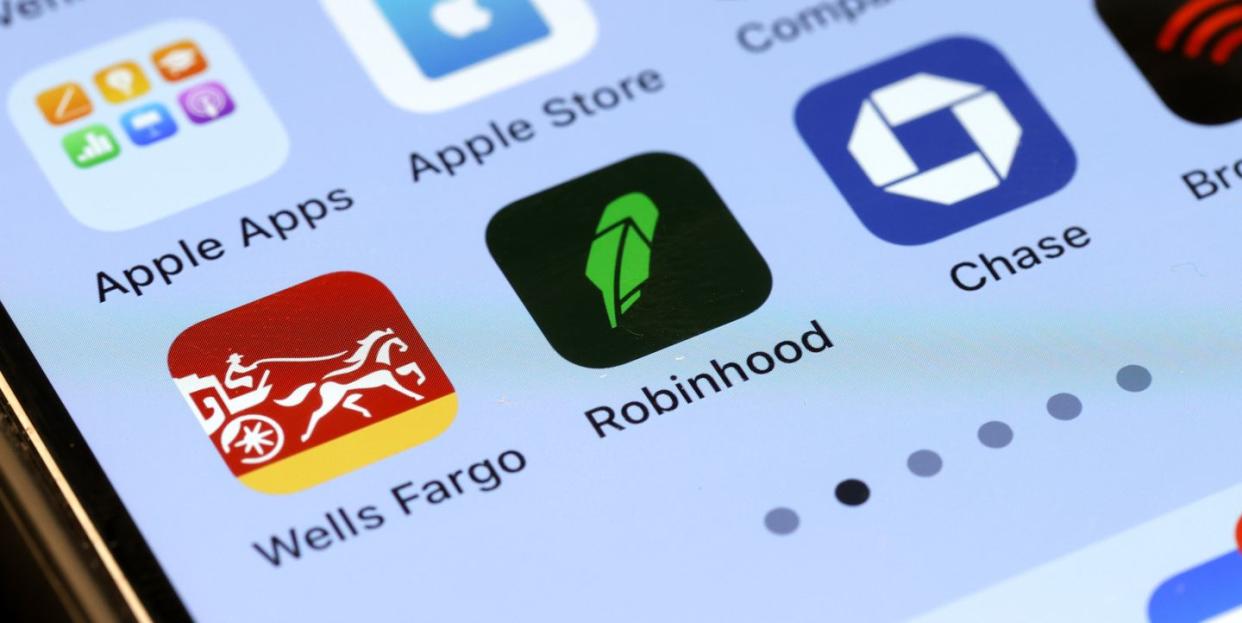Robinhood Is a Bouncer Who Works for the Guys Who Own the Club

Robinhood is, as of Thursday morning, a stock-trading app in which you are not allowed to buy stocks. Well, certain stocks—the ones that some rich and powerful people bet against. The big one is GameStop, but there's also Blackberry, AMC, Express, Bed Bath and Beyond, and Nokia. When those stocks went up big this week, thanks to a surge of interest generated on Reddit—a phenomenon that does not, at this point, seem to have been illegal—some of these hedge-fund types lost their shirts. They bet the stock would go down, and when it went up, they started to lose a lot of money. One of these poor hedge funds had to seek a bailout from another hedge fund. So this morning, Robinhood (and other brokerages like TD Ameritrade) banned users from buying those stocks. But Robinhood will still allow you to close out your position—to sell these stocks—which would, of course, be to the benefit of The Stonk Men.
To the layman, this might look like blatant market manipulation to benefit powerful interests in the financial-services industry. But no, Robinhood said in a press release, addressing their everyday retail investors, we did this for your own good. "Our mission at Robinhood is to democratize finance for all," they said, with or without a straight face. Meanwhile, because Robinhood makes trading stocks free for you and me, it actually makes money through fees from insiders in the financial-services industry. So in response to "market volatility," they did not halt trading altogether—as happens all the time—but merely halted trading that would hurt insiders in the financial-services industry. GameStop shares fell 60 percent following Robinhood's ban.

The math isn't complicated here, and the revulsion at all this has consumed a remarkable span of the political spectrum. Everybody can see this for what it is. These supposedly savvy market players—including Gabe Plotkin, the hedge-fund wunderkind who manages Melvin Capital, which got absolutely hosed—took a big bet and lost. They knew the rules and the risk, and rather than accept the outcome, the financial bigwigs are pulling strings to change those rules and avoid the consequences of their own actions. It's the same moral hazard that undergirded the 2008 financial crisis: a relatively small group of people are making big bets, but if they go wrong, they don't lose. Other people will. In this case, it'll probably be some of the Redditors on the other side. It was probably a joke when one of them wrote, "LEVERAGE YOUR HOUSE!!!! LETS GET THESE TENDIES!!!!" this week, but odds are that somebody without Gabe Plotkin's connections is going to lose big.
What the bigwigs have not accounted for, however, is how much the credibility of this entire enterprise is hanging by a thread. Throughout this pandemic, as the American economy contracted and hemorrhaged jobs and millions upon millions of citizens were immiserated, The Stonk Market powered upwards unabated. The picture began to come into focus: the equities markets are simply detached from the actual economy and any kind of value in the real world. It's a playground for speculators, a casino that runs on stock-buyback schemes and IPO nonsense and hype. If the stock market was ever really a mechanism for companies to raise funds for expanding their operations or research and development, it ain't that anymore. And now that ordinary people are trying to get involved, building their own hype machine on Internet forums, the people already in the game are trying to change the rules to keep them out. And Robinhood, which claimed to be inviting them in, has quickly shown them the door. Turns out the bouncer works for the guys who own the place. Maybe it's time to change that name, and to stop pretending that this is about democratizing anything.
Or we can carry on with the scam, and pretend this will all go on forever. Popular faith in our political economy is already so battered after 40 years of stagnant wages—and, more recently, declining life expectancy in the richest country in the history of the world—that a psychotic strongman appealing to racism and fear of the Other was able to escape the lab and lie his way into the nation's highest office. It seems unlikely that people will put up with a financial system mired in such blatant corruption much longer. This already has some of the same elements: a certain nihilism in response to the destructively absurd conditions that have dominated American life for so long, an online trolling aesthetic that escapes into the real world and has real consequences. As we traced back in May, the Stonk memes aren't just goofy throwaways. They represent multiple generations' ridicule, an extension of their growing disdain, for people who watch the numbers on the screen go up and down and consider that to be The Economy. People can see through the industry's jargon and grandiose self-regard now. Their desperation has turned to mockery and resistance, the first signs they are no longer afraid.

Join Now
You Might Also Like

